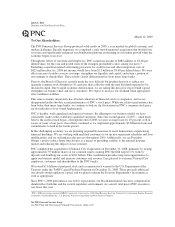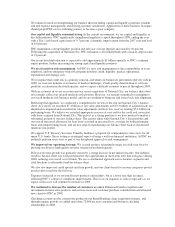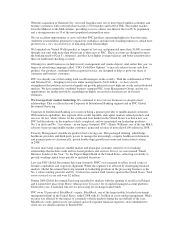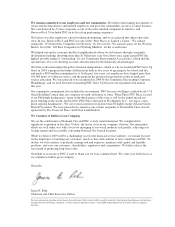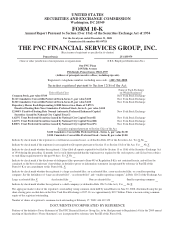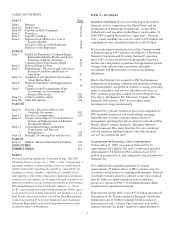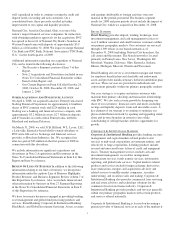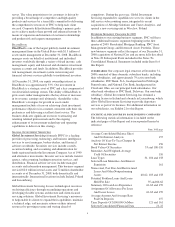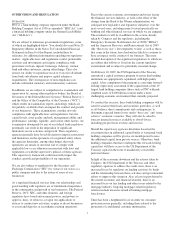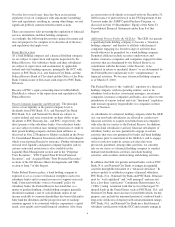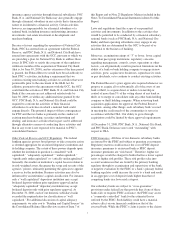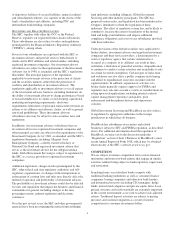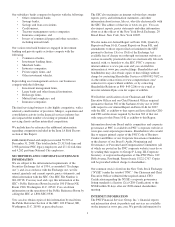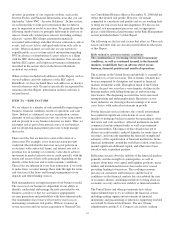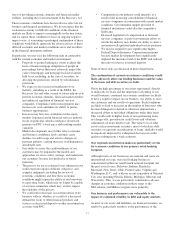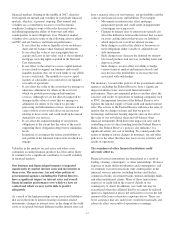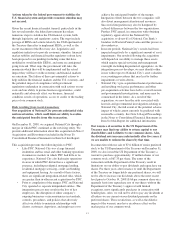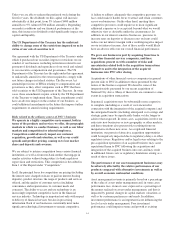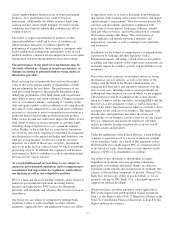PNC Bank 2008 Annual Report Download - page 9
Download and view the complete annual report
Please find page 9 of the 2008 PNC Bank annual report below. You can navigate through the pages in the report by either clicking on the pages listed below, or by using the keyword search tool below to find specific information within the annual report.
SUPERVISION AND REGULATION
O
VERVIEW
PNC is a bank holding company registered under the Bank
Holding Company Act of 1956 as amended (“BHC Act”) and
a financial holding company under the Gramm-Leach-Bliley
Act (“GLB Act”).
We are subject to numerous governmental regulations, some
of which are highlighted below. You should also read Note 23
Regulatory Matters in the Notes To Consolidated Financial
Statements in Item 8 of this Report, included here by
reference, for additional information regarding our regulatory
matters. Applicable laws and regulations restrict permissible
activities and investments and require compliance with
protections for loan, deposit, brokerage, fiduciary, mutual
fund and other customers, among other things. They also
restrict our ability to repurchase stock or to receive dividends
from bank subsidiaries and impose capital adequacy
requirements. The consequences of noncompliance can
include substantial monetary and nonmonetary sanctions.
In addition, we are subject to comprehensive examination and
supervision by, among other regulatory bodies, the Board of
Governors of the Federal Reserve System (“Federal Reserve”)
and the Office of the Comptroller of the Currency (“OCC”),
which results in examination reports and ratings (which are
not publicly available) that can impact the conduct and growth
of our businesses. These examinations consider not only
compliance with applicable laws and regulations, but also
capital levels, asset quality and risk, management ability and
performance, earnings, liquidity, and various other factors. An
examination downgrade by any of our federal bank regulators
potentially can result in the imposition of significant
limitations on our activities and growth. These regulatory
agencies generally have broad discretion to impose restrictions
and limitations on the operations of a regulated entity where
the agencies determine, among other things, that such
operations are unsafe or unsound, fail to comply with
applicable law or are otherwise inconsistent with laws and
regulations or with the supervisory policies of these agencies.
This supervisory framework could materially impact the
conduct, growth and profitability of our operations.
We are also subject to regulation by the Securities and
Exchange Commission (“SEC”) by virtue of our status as a
public company and due to the nature of some of our
businesses.
As a regulated financial services firm, our relationships and
good standing with regulators are of fundamental importance
to the continuation and growth of our businesses. The Federal
Reserve, OCC, SEC, and other domestic and foreign
regulators have broad enforcement powers, and powers to
approve, deny, or refuse to act upon our applications or
notices to conduct new activities, acquire or divest businesses
or assets and deposits, or reconfigure existing operations.
Due to the current economic environment and issues facing
the financial services industry, as well as the effect of the
change from the Bush to the Obama administration, we
anticipate new legislative and regulatory initiatives over the
next several years, including many focused specifically on
banking and other financial services in which we are engaged.
These initiatives will be in addition to the actions already
taken by Congress and the regulators, including the
Emergency Economic Stabilization Act of 2008 (“EESA”)
and the American Recovery and Reinvestment Act of 2009
(the “Recovery Act”). Developments to date, as well as those
that come in the future, have had and are likely to continue to
have an impact on the conduct of our business. The more
detailed description of the significant regulations to which we
are subject that follows is based on the current regulatory
environment and is subject to potentially material change.
On February 10, 2009, the US Department of the Treasury
announced a capital assistance program to ensure that banking
institutions are appropriately capitalized, with high quality
capital. A key component of the program is a one-time forward-
looking supervisory assessment of the capital needs of the 19
largest bank holding companies (those such as PNC with risk-
weighted assets of $100 billion or more) under a more
challenging economic environment than currently projected.
To conduct the exercise, these bank holding companies will be
asked to analyze their loans and securities portfolios, as well
as off-balance sheet commitments and contingencies, to
determine expected future losses under “base case” and “more
adverse” economic scenarios. They will also be asked to
forecast internal resources available to absorb losses,
including pre-provision revenue and reserves.
Should the supervisory agencies determine based on the
assessment that an additional capital buffer is warranted, bank
holding companies will be given a six month period to raise
the additional capital from private sources. Otherwise, bank
holding companies that have undergone this forward-looking
capital test will have access to the US Department of the
Treasury capital in the form of mandatorily convertible
preferred shares.
In light of the economic downturn and the actions taken by
Congress, the US Department of the Treasury and other
regulatory agencies to address the credit crisis, there is an
increased focus by regulators on lending activities by banks
and the relationship between those activities and governmental
efforts to improve this situation. Also at least in part driven by
the current economic and financial situation, there is an
increased focus on fair lending and other issues related to the
mortgage industry. Ongoing mortgage-related regulatory
reforms include measures aimed at limiting mortgage
foreclosures.
There has been a heightened focus recently on consumer
protection issues generally, including those related to the
protection of confidential customer information.
5

